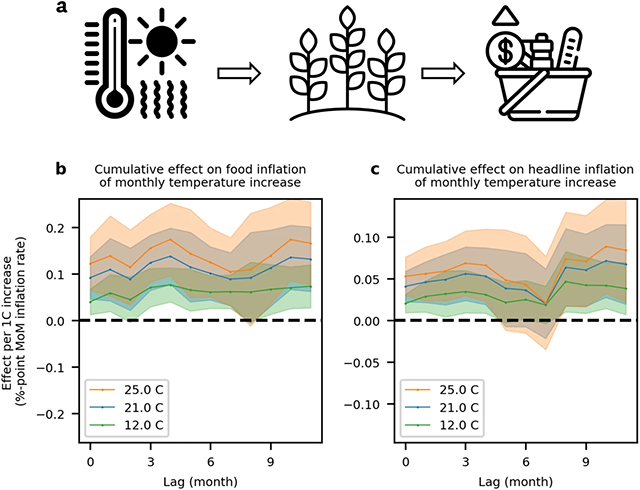
Vegetables in a market. Credit: Photo by nrd on Unsplash.
Economic Implications of Climate Change
As global temperatures climb, economists and policymakers are increasingly concerned about the secondary effects on economic stability. A recent study published in Nature sheds light on how rising temperatures are likely to boost inflation levels, affecting economies worldwide. Here’s what you need to know about the correlation between global warming and inflation, based on the latest research.
Key Findings: Temperature Increases and Inflation
The study utilizes a vast dataset encompassing over 27,000 observations of monthly consumer price indices from around the world. The findings are clear: higher temperatures are associated with significant increases in both food prices and overall inflation. This relationship persists over a 12-month period following temperature increases, suggesting long-term economic impacts.
Potential Impact on Electricity Prices
The study also highlights how rising temperatures could impact electricity prices. While the data on electricity specifically is not as robust as for overall inflation, the implications are significant given the increased demand for cooling during hotter periods. This heightened demand can strain supply and elevate electricity prices, further complicating the economic challenges posed by climate change.
Impact on Labor Productivity and Agricultural Yields
Higher temperatures are linked to reduced labor productivity, particularly in outdoor and non-air-conditioned environments, and lower crop yields. These factors contribute to the inflationary pressures observed in the study. Reduced productivity and agricultural output exacerbate economic stress during heatwaves, making communities more vulnerable to price increases.
Regional Impact Variations
The inflationary impact of rising temperatures is not uniform across all geographies. In regions with higher latitudes, inflation spikes during the hottest months of the year. In contrast, at lower latitudes, where temperatures are generally warmer, inflationary pressures are more consistent throughout the year.
Future Projections and Economic Forecasting
Looking ahead to 2035, the study projects substantial increases in inflation due to expected temperature rises. Under various climate models and emissions scenarios, global average food inflation could increase by 0.92 to 3.23 percentage points per year, while headline inflation could rise by 0.32 to 1.18 percentage points per year. These projections highlight the urgency for adaptive measures in monetary policies and economic planning.

The cumulative marginal effect of temperature shocks on food and headline inflation. From Kotz, M., Kuik, F., Lis, E., & Nickel, C. (2024). Global warming and heat extremes to enhance inflationary pressures. Communications Earth & Environment, 5(116). (a) A schematic outline of the mechanisms via which temperature shocks may impact inflation via agricultural productivity and food prices. The results of fixed-effects panel regressions from over 27,000 observations of monthly price indices and weather fluctuations worldwide over the period 1996-2021 demonstrate persistent impacts on food (b) and headline (c) prices from a one-off increase in monthly average temperature. Lines indicate the cumulative marginal effects of a one-off 1 C increase in monthly temperature on month-on-month inflation rates, evaluated at different baseline temperatures (colour) reflecting the non-linearity of the response by baseline temperatures which differ across both seasons and regions (see methods for a specific explanation of the estimation of these marginal effects from the regression models). Error bars show the 95% confidence intervals having clustered standard errors by country. Full regression results are shown in Tables S2 & S3. Icons are obtained from Flaticon using work from Febrian Hidayat, Vectors Tank and Freepik.
Implications for Monetary Policy
The direct correlation between temperature increases and inflation has significant implications for central banks and monetary policymakers. Traditional monetary policy may need to evolve to address the challenges posed by climate-induced inflation, especially as these effects become more pronounced.
The Necessity for Socioeconomic Adaptation
The study underscores a critical gap in socioeconomic adaptation to rising temperatures. Historical data suggests limited adaptation through economic development, pointing to the need for unprecedented changes in future strategies. To mitigate inflationary pressures, enhanced agricultural resilience and economic adjustments are essential.
Summing Up
This research provides a crucial understanding of how climate change directly affects economic fundamentals such as inflation. It underscores the necessity for policymakers, particularly in economic and financial sectors, to consider the broader impacts of climate change—not just environmental but also economic. As the planet warms, the intertwined fates of our climate and economies become increasingly hard to ignore, demanding integrated approaches to climate policy and economic management.
Source: Kotz, M., Kuik, F., Lis, E., & Nickel, C. (2024). Global warming and heat extremes to enhance inflationary pressures. Communications Earth & Environment, 5(116). https://doi.org/10.1038/s43247-023-01173-x
